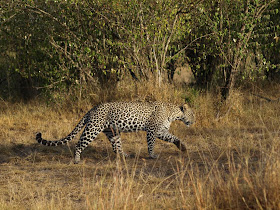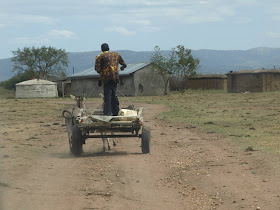The morning of July 8, 2007 started as any other. We were doing morning observations for the Mara River clan. On our way to begin a prey census we happened upon three young cheetahs. We stopped about 20 meters from them in order to record their location. We keep records of locations of carnivores we see in the park. We stopped to record the location and watched the cheetahs for a few minutes. Then curiosity got the best of the cats and they approached the car.
After chewing on the tires a bit, one decided to investigate my door. It was scratching at the door, nearly sticking its head in my window. The cheetahs then proceeded to the hood of the truck. At one point the third cheetah tried to jump onto the hood, but there was not enough room and it fell back down. They sat contently on the hood for a few minutes, while we in the car were in disbelief this was actually happening.
They then went onto the roof of the truck and began chewing on our tracking equipment. This was not acceptable, so we had to scold them to stop chewing on our stuff. They did not listen well. Eventually they got bored and hopped down. We did not get bored and would probably still be sitting there if they had not decided to move on. Truly a surreal experience.
 If you look closely you can read "Michigan State University Hyena Research" on the hood of the truck. Good PR photo for MSU.
If you look closely you can read "Michigan State University Hyena Research" on the hood of the truck. Good PR photo for MSU. Recognize this picture?
Recognize this picture? My standard photo whenever I need a picture of myself. (Photo by Katy Califf)
My standard photo whenever I need a picture of myself. (Photo by Katy Califf) Can I eat that thing?
Can I eat that thing? Scanning for prey...on the hood of our truck!
Scanning for prey...on the hood of our truck! They are not really crying. The black lines running down their face help to absorb sunlight. This is important for animals that hunt during the day. If you look closely at the lion pictures from the previous post you can see they have light colored patches around their eyes. This helps with night vision, which is important because lions do most of their hunting at night.
They are not really crying. The black lines running down their face help to absorb sunlight. This is important for animals that hunt during the day. If you look closely at the lion pictures from the previous post you can see they have light colored patches around their eyes. This helps with night vision, which is important because lions do most of their hunting at night.I have links for video of the cheetahs on our truck on my website. Click the photos link to navigate to them.
http://www.msu.edu/user/fliesand/index.htm
Hello to Carolyn Kolar. I hope you stay interested in cheetahs, but don't forget about hyenas!














































